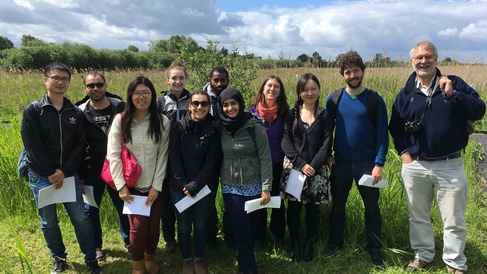
Jeremy Purseglove who serves as chair for the National Trust’s Wicken Fen Local Committee took the students round the core wetland, the newly created Vision area and the proposed Vision land threatened by the Waterbeach New Town, explaining all the dilemmas and problems.
The students were able to meet the warden, site manager and discuss the issues concerning the grazing regime by wild wetland horses from Poland. Wildlife present in June included orchids, many species of dragonfly, and breeding birds including marsh harriers, lapwing, redshank, bittern, avocet and many species of duck.
Wicken Fen is an iconic wetland and Britain’s oldest nature reserve, having been acquired by the National Trust shortly after its foundation in 1895. It is a very rare example of surviving undrained fenland, a landscape recognizable in medieval times but now marooned in a modern desert of agribusiness. In the twentieth century it was the habitat where scientists from Cambridge University first formulated the basic principles of ecology. In the twenty-first century it is a pioneering example of new habitat creation which has already doubled the size of the original site and is being managed experimentally with reference to the latest principles of Rewilding. It also attempts the difficult balancing act of providing a major new recreational space and cycle links for Cambridge combined with a National Nature Reserve for shy breeding birds. The fen has long been the subject of controversy, surviving serious attempts at drainage in World War II and currently facing adverse impacts from the proposed Waterbeach New Town, which plans to create 9000 new homes and many tall buildings including two 30m high towers.
